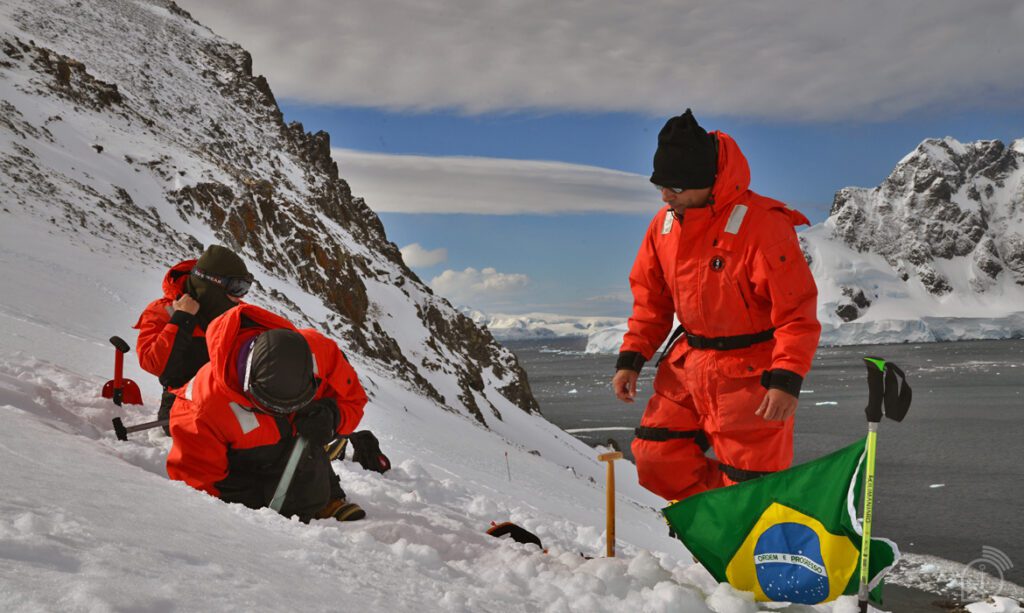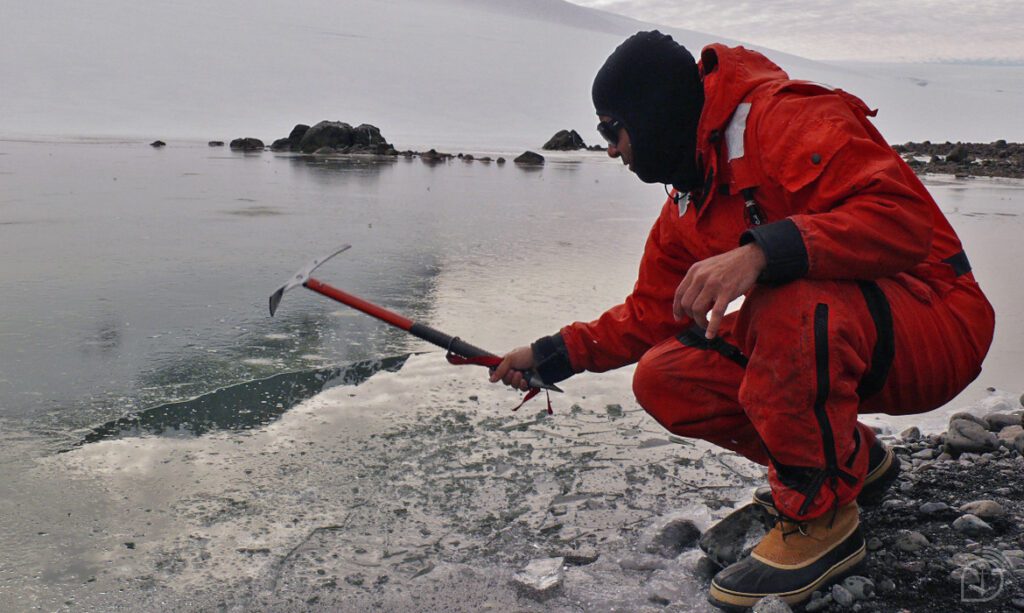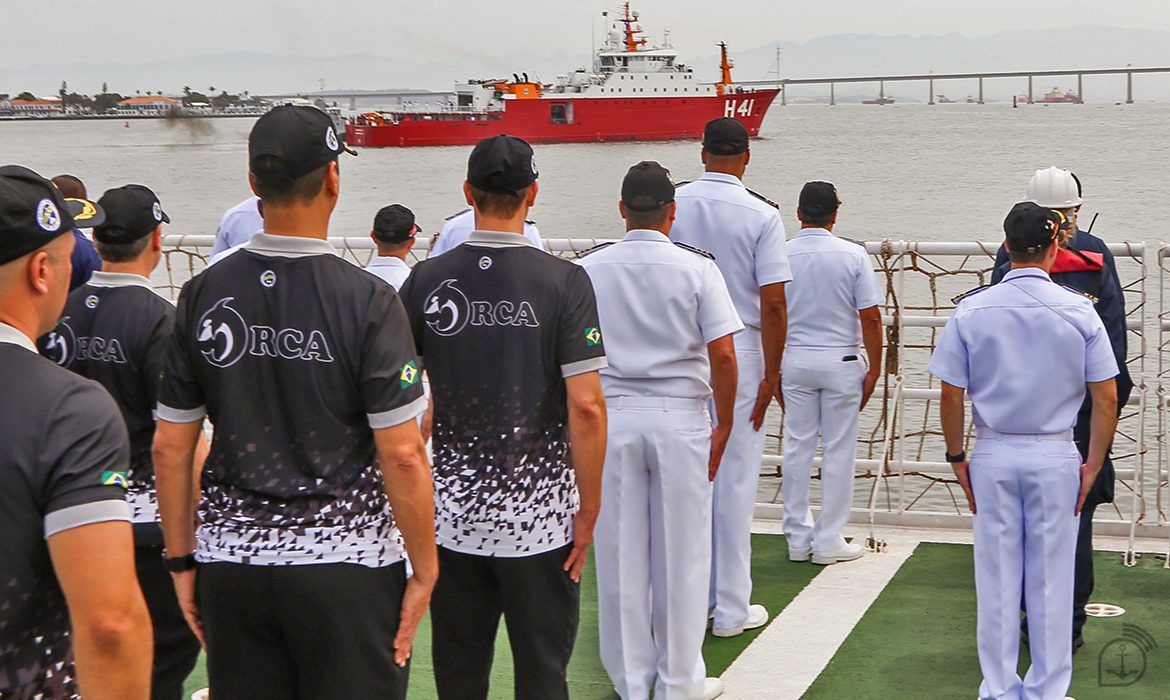Operation completed 40 years in 2022 and continues with quality research in the region
By First Lieutenant (RM2-T) Leonardo Ferreira Trindade – Rio de Janeiro, RJ
On Sunday (9), the Oceanographic Support Ship (NApOcARongel) “Ary Rongel” and the Polar Ship (NPoAlteMaximiano) “Almirante Maximiano” left the Naval Base of Ilha das Cobras heading for the Antarctic continent, and are expected to remain there until April 2023.
The Antarctic Operation (OPERANTAR) completes four decades this year, 2022, and, in addition to the purpose of local preservation and all biodiversity, its main objective is to promote diverse and high quality scientific research in the Antarctic region, thus ensuring Brazil the status of Advisory Member of the Antarctic Treaty.
OPERANTAR XLI will also continue the return to full use of the laboratories of the new Comandante Ferraz Antarctic Station (EACF) and the in loco investigations already begun last summer, enabling the continuity of scientific production and the country’s presence in the southern continent.
Both the “Almirante Maximiano” ship and the “Ary Rongel” transport crew members and researchers between Brazil and the EACF, as well as launch and pick up camps of researchers scattered throughout Antarctica, by boat or helicopter. In addition, they have seven laboratories in total for on-board research processing. According to the Commander of NPoAlteMaximiano, Sea and War Captain Dieferson Ramos Pinheiro, “the ships will support the scientific projects in various areas of knowledge of OPERANTAR XLI.
Within these projects research will be carried out in the most diverse fields, such as meteorological, atmospheric, oceanographic, hydrographic, morphological, biological and paleontological. It is noteworthy that, besides the academic knowledge, such research may bring benefits to the fields of medicine, with the formulation of drugs; agriculture, in the development of new pesticides and herbicides; and industry, in the manufacture of products such as antifreeze and sunscreens.
For the Commander of NApOcARongel, Sea and War Captain Fabiano de Medeiros Ichayo, “studying Antarctica is very important as humanity concentrates its efforts on finding solutions for the impacts of global climate change, since it is indispensable to the understanding of the planet’s physical and environmental evolution, as well as a preponderant factor on the Earth’s climate.
Brazilian Antarctic Program

The Brazilian Antarctic Program (PROANTAR) is structured in four basic aspects: the scientific one, under the coordination of the Ministry of Science, Technology and Innovation and the National Council for Scientific and Technological Development; the environmental one, under the responsibility of the Ministry of the Environment; the logistic one, under the responsibility of the Ministry of Defense, with the coordination and realization of the Brazilian Navy (MB); and the foreign policy one, under the responsibility of the Ministry of Foreign Affairs.
As goals of the program one can highlight: the development of diversified research, obtaining and producing technological and scientific data, supporting the training, improvement and specialization of Brazilian researchers, encouraging and providing the means to emphasize Brazilian representativeness, developing technological solutions, promoting a central scientific information system, developing environmental monitoring programs in the areas of Brazilian activities in Antarctica, and supporting educational activities at all levels, including international academic exchange.
As stated by the person in charge of PROANTAR’s International Relations Division, Sea and War Captain Haynnée Trad Souza, “the oceanographic and meteorological research developed in Antarctica allows for a better understanding of the natural phenomena that directly influence the climate in Brazil, allowing for the improvement of the numerical models used in weather forecasting in the Brazilian coastal region, contributing to the safety of oil and gas exploration and exploitation operations along the South American coast.
This year, 130 researchers from different institutions will be part of the group that will carry out research to collect samples and data in Antarctica, one of them being the biologist and professor from the Department of Microbiology at the Federal University of Minas Gerais (UFMG), Dr. Luiz Henrique Rosa, who has a project on the diversity and biotechnology of fungi on the frozen continent.
“Carrying out scientific activities at the Comandante Ferraz Antarctic Station is a privilege, because the work of Antarctic science is complex, since it involves peculiar characteristics, because besides the science itself, we have the challenge of the climatic condition and the geopolitical character, so the planning takes place during an entire year, but, even so, we can only work and develop our research if Antarctica lets us. That is why working at the Comandante Ferraz station not only represents a very important activity for Brazilian research but also for the whole world,” he points out.
The researcher also highlights the support provided by the MB, regarding partnerships and logistics on the frozen continent. “The partnership between universities and research institutes with the MB for the execution of PROANTAR is fundamental. The Navy has a great logistical expertise that allows us to access regions of the Antarctic Peninsula to collect our samples and the data that are fundamental for the execution of the scientific work.
The collection of data represents a great scientific production for Brazil, since it turns human resources into masters, doctors, and post-doctors. The MB has a vast knowledge of Antarctica, and the polar ships ‘Almirante Maximiano’ and ‘Ary Rongel’ are essential for the accomplishment of such a feat, because they have catalogued various data and histories of regions accessed on other voyages as well as places that we will still access,” adds the professor.
Antarctica – The frozen continent

The most inhospitable continent on the planet, Antarctica has more than 90% of its territory covered by ice and about 70% of the world’s fresh water. Its proximity to South America makes the Antarctic region especially relevant for Brazil, to the extent that it has been considered part of the country’s strategic environment.
Furthermore, Antarctica stands out for being managed through an international regime based on a system of conventions and documents, which defined research activities as the fundamental purpose of the region’s occupation. According to Commander Dieferson “the importance of the development of research activities is due to the fact that it allows the consolidation of PROANTAR, accrediting the country to influence in all the decisions made in the scope of the Antarctic Treaty System, as a consultative member of this treaty.
These research activities have ensured the presence of Brazilians, especially researchers, in Antarctica. Another important point is that all studies related to the oceans, such as hydrography and oceanography, are of vital importance for the MB to take full advantage of the operational capabilities of our submarines. The ships are scheduled to arrive in Antarctica on November 7th.
*** Translated by the DEFCONPress FYI Team ***
